Healthcare Assignment 3: Strategies in Collaborative Nursing Approach
VerifiedAdded on 2022/10/17
|10
|2864
|246
Report
AI Summary
This healthcare assignment delves into the collaborative nursing approach, emphasizing its significance in mental healthcare. The report highlights the importance of collaborative efforts between nursing professionals and other care providers to develop effective care strategies for mentally ill patients. It explores the benefits of therapeutic relationships, trust, and open communication in fostering patient well-being, while also discussing the need for nurses to understand the experiences of mental health consumers. The assignment further examines the role of communication and behavioral skills in establishing these relationships and developing tailored care plans. The author reflects on a personal experience in a hospital setting, illustrating the challenges of providing care and emphasizes the need for improved communication skills to create effective therapeutic bonds with patients. The report concludes by underscoring the importance of collaborative approaches for improved patient outcomes.
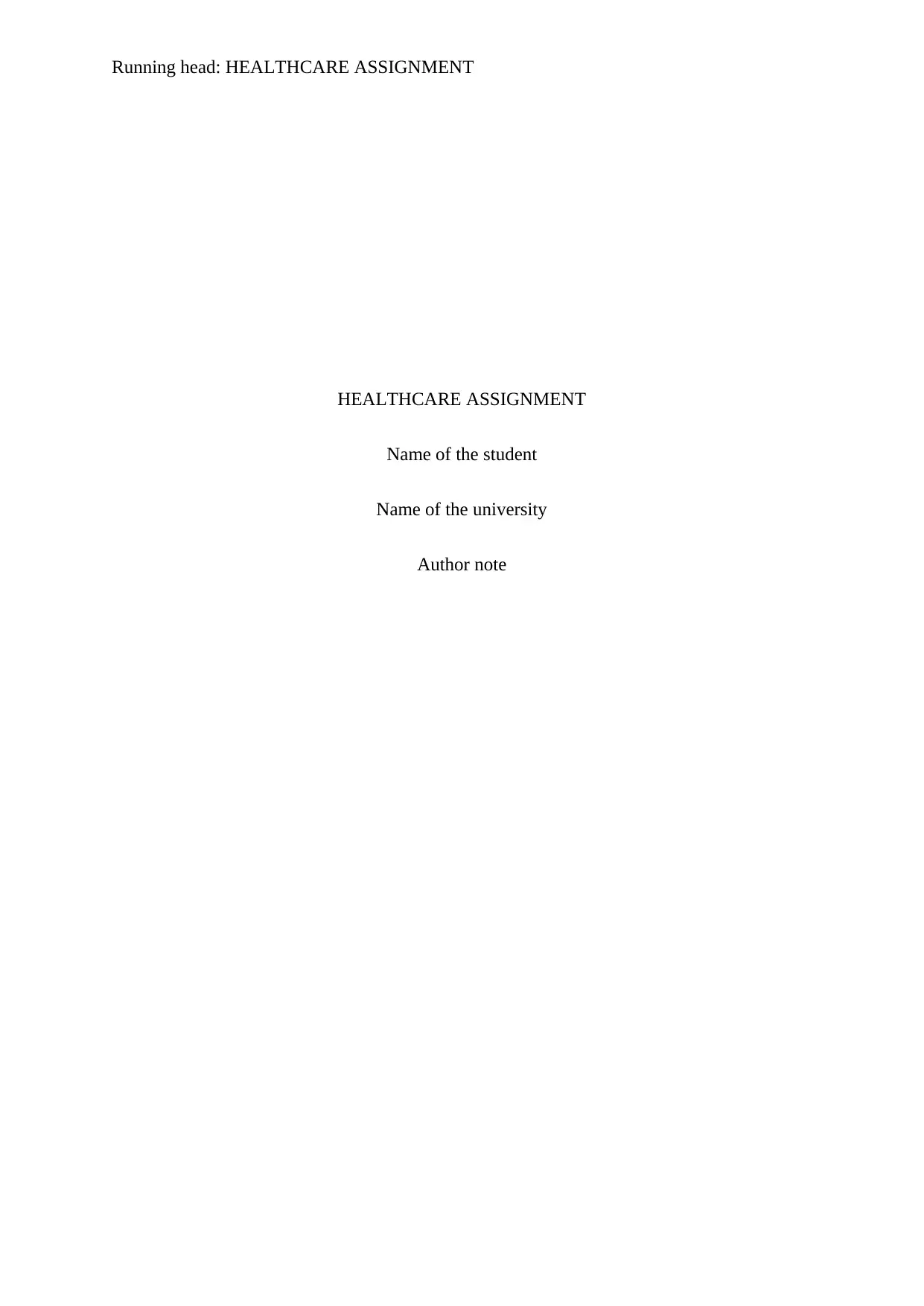
Running head: HEALTHCARE ASSIGNMENT
HEALTHCARE ASSIGNMENT
Name of the student
Name of the university
Author note
HEALTHCARE ASSIGNMENT
Name of the student
Name of the university
Author note
Paraphrase This Document
Need a fresh take? Get an instant paraphrase of this document with our AI Paraphraser
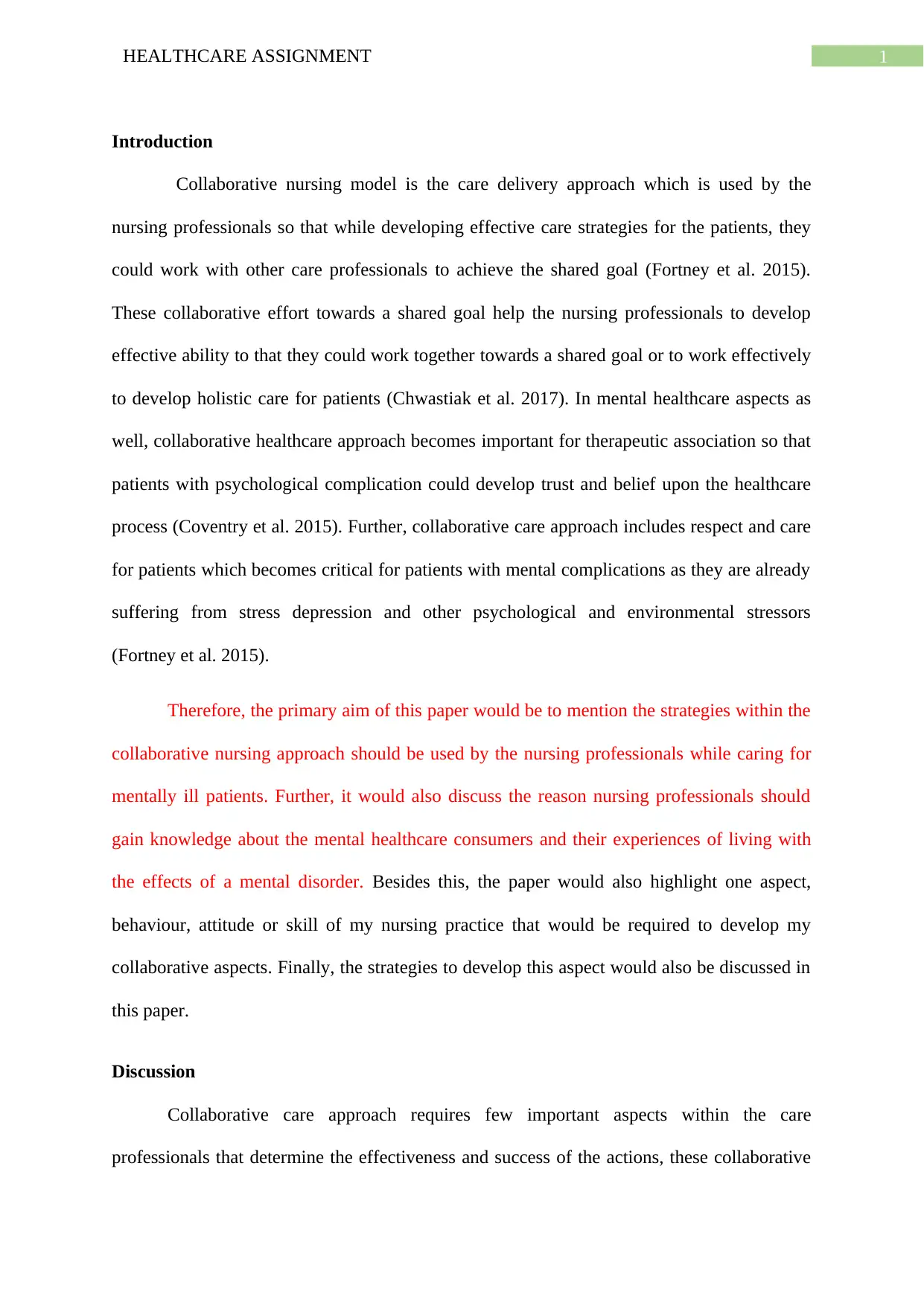
1HEALTHCARE ASSIGNMENT
Introduction
Collaborative nursing model is the care delivery approach which is used by the
nursing professionals so that while developing effective care strategies for the patients, they
could work with other care professionals to achieve the shared goal (Fortney et al. 2015).
These collaborative effort towards a shared goal help the nursing professionals to develop
effective ability to that they could work together towards a shared goal or to work effectively
to develop holistic care for patients (Chwastiak et al. 2017). In mental healthcare aspects as
well, collaborative healthcare approach becomes important for therapeutic association so that
patients with psychological complication could develop trust and belief upon the healthcare
process (Coventry et al. 2015). Further, collaborative care approach includes respect and care
for patients which becomes critical for patients with mental complications as they are already
suffering from stress depression and other psychological and environmental stressors
(Fortney et al. 2015).
Therefore, the primary aim of this paper would be to mention the strategies within the
collaborative nursing approach should be used by the nursing professionals while caring for
mentally ill patients. Further, it would also discuss the reason nursing professionals should
gain knowledge about the mental healthcare consumers and their experiences of living with
the effects of a mental disorder. Besides this, the paper would also highlight one aspect,
behaviour, attitude or skill of my nursing practice that would be required to develop my
collaborative aspects. Finally, the strategies to develop this aspect would also be discussed in
this paper.
Discussion
Collaborative care approach requires few important aspects within the care
professionals that determine the effectiveness and success of the actions, these collaborative
Introduction
Collaborative nursing model is the care delivery approach which is used by the
nursing professionals so that while developing effective care strategies for the patients, they
could work with other care professionals to achieve the shared goal (Fortney et al. 2015).
These collaborative effort towards a shared goal help the nursing professionals to develop
effective ability to that they could work together towards a shared goal or to work effectively
to develop holistic care for patients (Chwastiak et al. 2017). In mental healthcare aspects as
well, collaborative healthcare approach becomes important for therapeutic association so that
patients with psychological complication could develop trust and belief upon the healthcare
process (Coventry et al. 2015). Further, collaborative care approach includes respect and care
for patients which becomes critical for patients with mental complications as they are already
suffering from stress depression and other psychological and environmental stressors
(Fortney et al. 2015).
Therefore, the primary aim of this paper would be to mention the strategies within the
collaborative nursing approach should be used by the nursing professionals while caring for
mentally ill patients. Further, it would also discuss the reason nursing professionals should
gain knowledge about the mental healthcare consumers and their experiences of living with
the effects of a mental disorder. Besides this, the paper would also highlight one aspect,
behaviour, attitude or skill of my nursing practice that would be required to develop my
collaborative aspects. Finally, the strategies to develop this aspect would also be discussed in
this paper.
Discussion
Collaborative care approach requires few important aspects within the care
professionals that determine the effectiveness and success of the actions, these collaborative
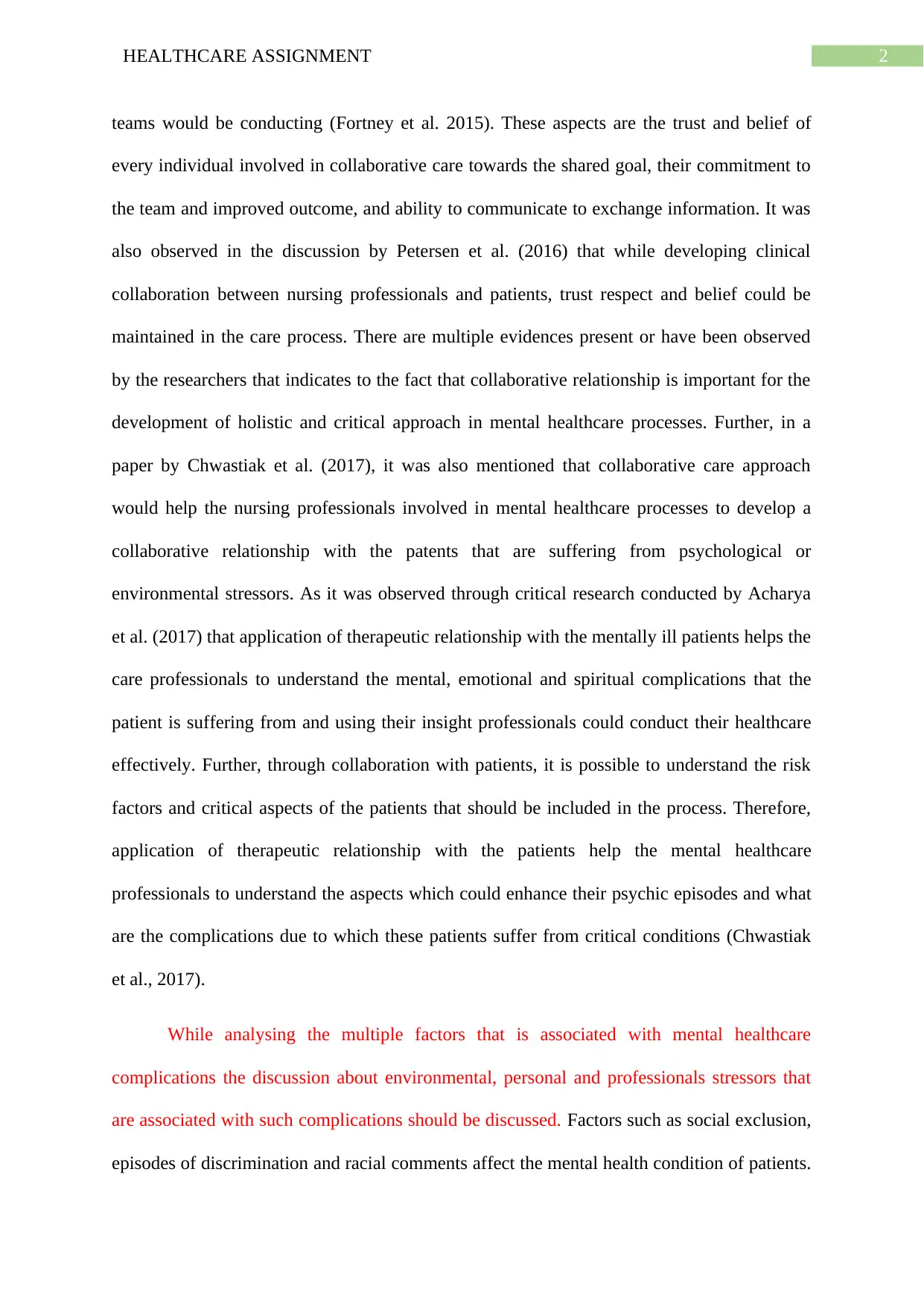
2HEALTHCARE ASSIGNMENT
teams would be conducting (Fortney et al. 2015). These aspects are the trust and belief of
every individual involved in collaborative care towards the shared goal, their commitment to
the team and improved outcome, and ability to communicate to exchange information. It was
also observed in the discussion by Petersen et al. (2016) that while developing clinical
collaboration between nursing professionals and patients, trust respect and belief could be
maintained in the care process. There are multiple evidences present or have been observed
by the researchers that indicates to the fact that collaborative relationship is important for the
development of holistic and critical approach in mental healthcare processes. Further, in a
paper by Chwastiak et al. (2017), it was also mentioned that collaborative care approach
would help the nursing professionals involved in mental healthcare processes to develop a
collaborative relationship with the patents that are suffering from psychological or
environmental stressors. As it was observed through critical research conducted by Acharya
et al. (2017) that application of therapeutic relationship with the mentally ill patients helps the
care professionals to understand the mental, emotional and spiritual complications that the
patient is suffering from and using their insight professionals could conduct their healthcare
effectively. Further, through collaboration with patients, it is possible to understand the risk
factors and critical aspects of the patients that should be included in the process. Therefore,
application of therapeutic relationship with the patients help the mental healthcare
professionals to understand the aspects which could enhance their psychic episodes and what
are the complications due to which these patients suffer from critical conditions (Chwastiak
et al., 2017).
While analysing the multiple factors that is associated with mental healthcare
complications the discussion about environmental, personal and professionals stressors that
are associated with such complications should be discussed. Factors such as social exclusion,
episodes of discrimination and racial comments affect the mental health condition of patients.
teams would be conducting (Fortney et al. 2015). These aspects are the trust and belief of
every individual involved in collaborative care towards the shared goal, their commitment to
the team and improved outcome, and ability to communicate to exchange information. It was
also observed in the discussion by Petersen et al. (2016) that while developing clinical
collaboration between nursing professionals and patients, trust respect and belief could be
maintained in the care process. There are multiple evidences present or have been observed
by the researchers that indicates to the fact that collaborative relationship is important for the
development of holistic and critical approach in mental healthcare processes. Further, in a
paper by Chwastiak et al. (2017), it was also mentioned that collaborative care approach
would help the nursing professionals involved in mental healthcare processes to develop a
collaborative relationship with the patents that are suffering from psychological or
environmental stressors. As it was observed through critical research conducted by Acharya
et al. (2017) that application of therapeutic relationship with the mentally ill patients helps the
care professionals to understand the mental, emotional and spiritual complications that the
patient is suffering from and using their insight professionals could conduct their healthcare
effectively. Further, through collaboration with patients, it is possible to understand the risk
factors and critical aspects of the patients that should be included in the process. Therefore,
application of therapeutic relationship with the patients help the mental healthcare
professionals to understand the aspects which could enhance their psychic episodes and what
are the complications due to which these patients suffer from critical conditions (Chwastiak
et al., 2017).
While analysing the multiple factors that is associated with mental healthcare
complications the discussion about environmental, personal and professionals stressors that
are associated with such complications should be discussed. Factors such as social exclusion,
episodes of discrimination and racial comments affect the mental health condition of patients.
⊘ This is a preview!⊘
Do you want full access?
Subscribe today to unlock all pages.

Trusted by 1+ million students worldwide
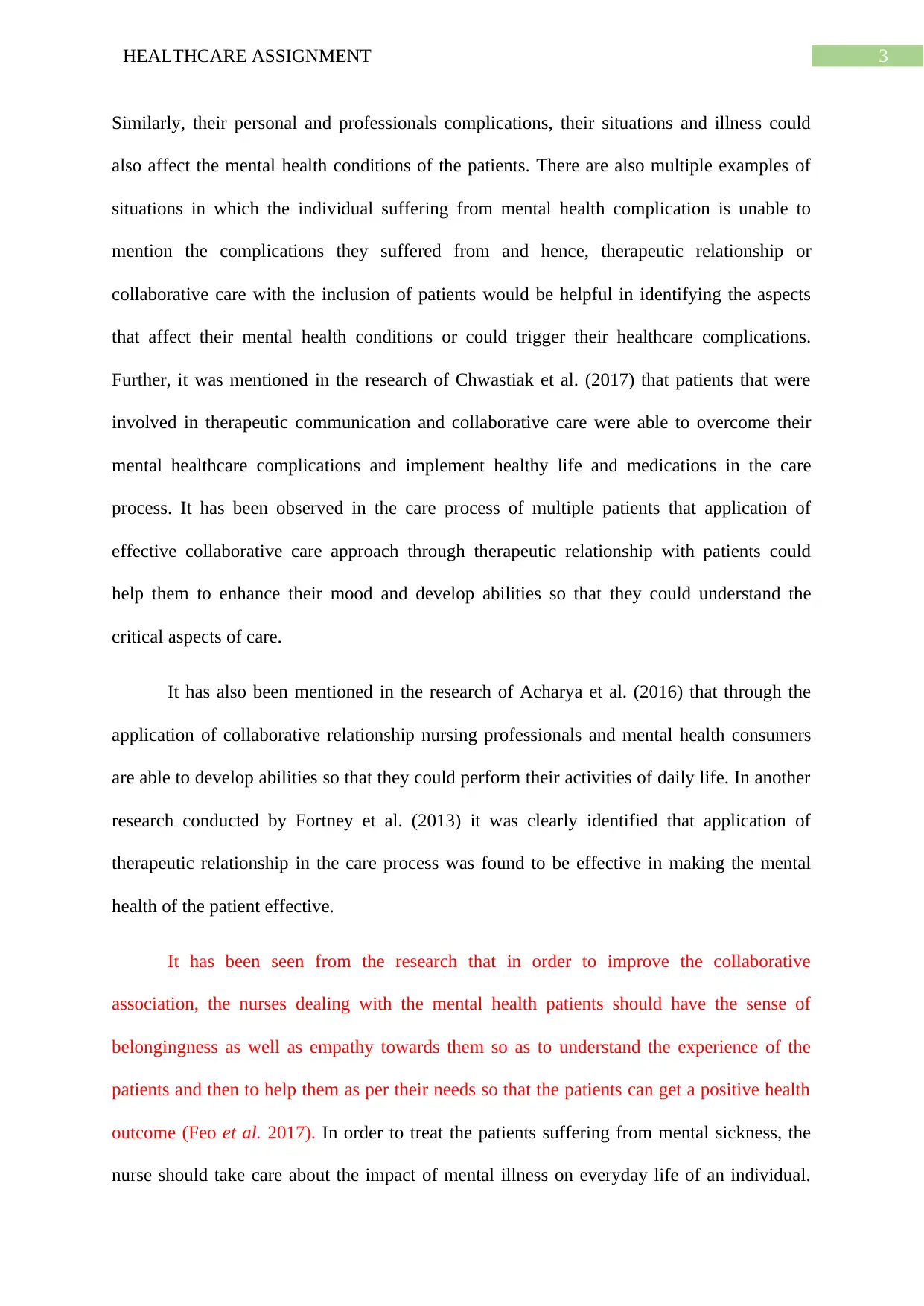
3HEALTHCARE ASSIGNMENT
Similarly, their personal and professionals complications, their situations and illness could
also affect the mental health conditions of the patients. There are also multiple examples of
situations in which the individual suffering from mental health complication is unable to
mention the complications they suffered from and hence, therapeutic relationship or
collaborative care with the inclusion of patients would be helpful in identifying the aspects
that affect their mental health conditions or could trigger their healthcare complications.
Further, it was mentioned in the research of Chwastiak et al. (2017) that patients that were
involved in therapeutic communication and collaborative care were able to overcome their
mental healthcare complications and implement healthy life and medications in the care
process. It has been observed in the care process of multiple patients that application of
effective collaborative care approach through therapeutic relationship with patients could
help them to enhance their mood and develop abilities so that they could understand the
critical aspects of care.
It has also been mentioned in the research of Acharya et al. (2016) that through the
application of collaborative relationship nursing professionals and mental health consumers
are able to develop abilities so that they could perform their activities of daily life. In another
research conducted by Fortney et al. (2013) it was clearly identified that application of
therapeutic relationship in the care process was found to be effective in making the mental
health of the patient effective.
It has been seen from the research that in order to improve the collaborative
association, the nurses dealing with the mental health patients should have the sense of
belongingness as well as empathy towards them so as to understand the experience of the
patients and then to help them as per their needs so that the patients can get a positive health
outcome (Feo et al. 2017). In order to treat the patients suffering from mental sickness, the
nurse should take care about the impact of mental illness on everyday life of an individual.
Similarly, their personal and professionals complications, their situations and illness could
also affect the mental health conditions of the patients. There are also multiple examples of
situations in which the individual suffering from mental health complication is unable to
mention the complications they suffered from and hence, therapeutic relationship or
collaborative care with the inclusion of patients would be helpful in identifying the aspects
that affect their mental health conditions or could trigger their healthcare complications.
Further, it was mentioned in the research of Chwastiak et al. (2017) that patients that were
involved in therapeutic communication and collaborative care were able to overcome their
mental healthcare complications and implement healthy life and medications in the care
process. It has been observed in the care process of multiple patients that application of
effective collaborative care approach through therapeutic relationship with patients could
help them to enhance their mood and develop abilities so that they could understand the
critical aspects of care.
It has also been mentioned in the research of Acharya et al. (2016) that through the
application of collaborative relationship nursing professionals and mental health consumers
are able to develop abilities so that they could perform their activities of daily life. In another
research conducted by Fortney et al. (2013) it was clearly identified that application of
therapeutic relationship in the care process was found to be effective in making the mental
health of the patient effective.
It has been seen from the research that in order to improve the collaborative
association, the nurses dealing with the mental health patients should have the sense of
belongingness as well as empathy towards them so as to understand the experience of the
patients and then to help them as per their needs so that the patients can get a positive health
outcome (Feo et al. 2017). In order to treat the patients suffering from mental sickness, the
nurse should take care about the impact of mental illness on everyday life of an individual.
Paraphrase This Document
Need a fresh take? Get an instant paraphrase of this document with our AI Paraphraser
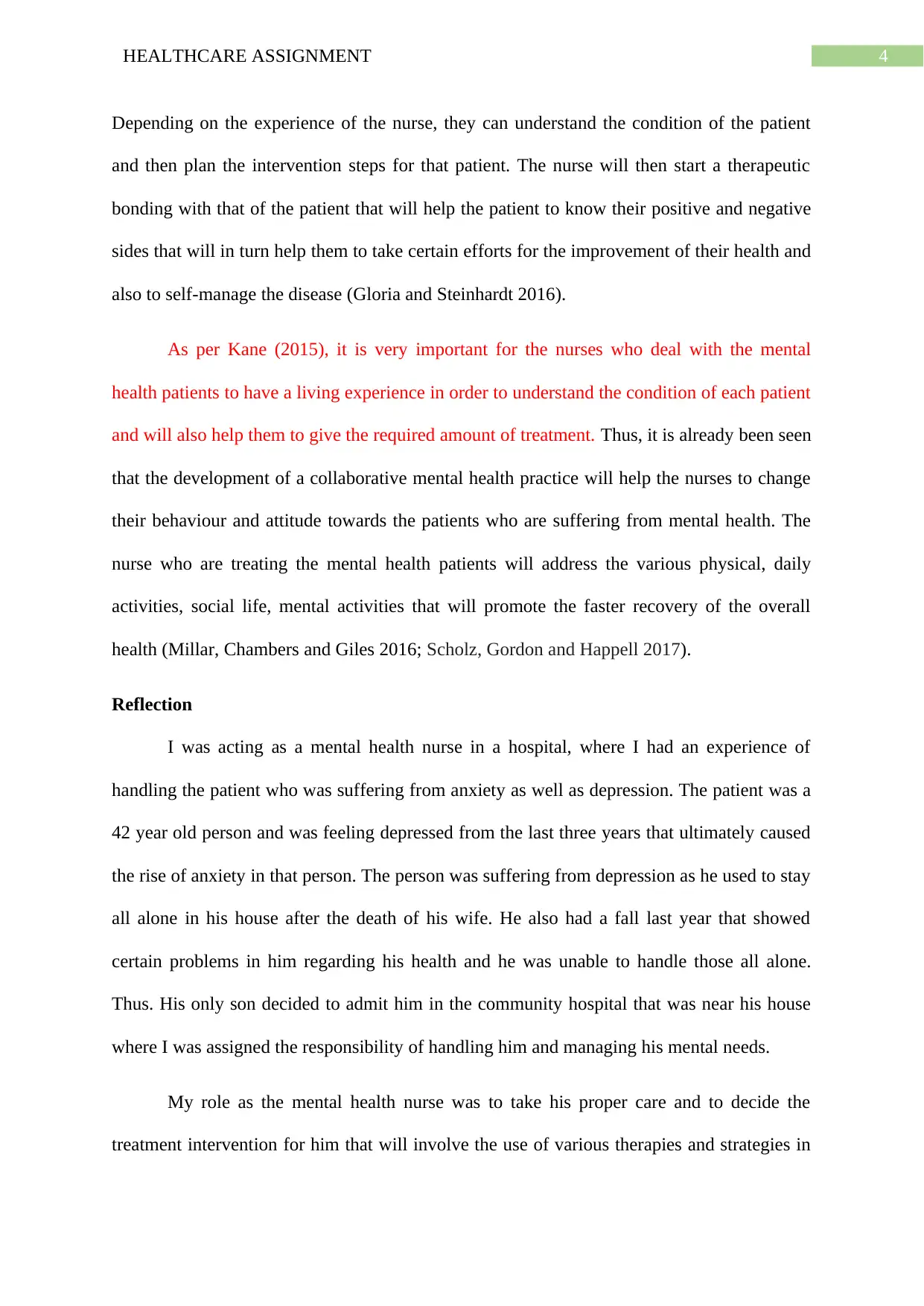
4HEALTHCARE ASSIGNMENT
Depending on the experience of the nurse, they can understand the condition of the patient
and then plan the intervention steps for that patient. The nurse will then start a therapeutic
bonding with that of the patient that will help the patient to know their positive and negative
sides that will in turn help them to take certain efforts for the improvement of their health and
also to self-manage the disease (Gloria and Steinhardt 2016).
As per Kane (2015), it is very important for the nurses who deal with the mental
health patients to have a living experience in order to understand the condition of each patient
and will also help them to give the required amount of treatment. Thus, it is already been seen
that the development of a collaborative mental health practice will help the nurses to change
their behaviour and attitude towards the patients who are suffering from mental health. The
nurse who are treating the mental health patients will address the various physical, daily
activities, social life, mental activities that will promote the faster recovery of the overall
health (Millar, Chambers and Giles 2016; Scholz, Gordon and Happell 2017).
Reflection
I was acting as a mental health nurse in a hospital, where I had an experience of
handling the patient who was suffering from anxiety as well as depression. The patient was a
42 year old person and was feeling depressed from the last three years that ultimately caused
the rise of anxiety in that person. The person was suffering from depression as he used to stay
all alone in his house after the death of his wife. He also had a fall last year that showed
certain problems in him regarding his health and he was unable to handle those all alone.
Thus. His only son decided to admit him in the community hospital that was near his house
where I was assigned the responsibility of handling him and managing his mental needs.
My role as the mental health nurse was to take his proper care and to decide the
treatment intervention for him that will involve the use of various therapies and strategies in
Depending on the experience of the nurse, they can understand the condition of the patient
and then plan the intervention steps for that patient. The nurse will then start a therapeutic
bonding with that of the patient that will help the patient to know their positive and negative
sides that will in turn help them to take certain efforts for the improvement of their health and
also to self-manage the disease (Gloria and Steinhardt 2016).
As per Kane (2015), it is very important for the nurses who deal with the mental
health patients to have a living experience in order to understand the condition of each patient
and will also help them to give the required amount of treatment. Thus, it is already been seen
that the development of a collaborative mental health practice will help the nurses to change
their behaviour and attitude towards the patients who are suffering from mental health. The
nurse who are treating the mental health patients will address the various physical, daily
activities, social life, mental activities that will promote the faster recovery of the overall
health (Millar, Chambers and Giles 2016; Scholz, Gordon and Happell 2017).
Reflection
I was acting as a mental health nurse in a hospital, where I had an experience of
handling the patient who was suffering from anxiety as well as depression. The patient was a
42 year old person and was feeling depressed from the last three years that ultimately caused
the rise of anxiety in that person. The person was suffering from depression as he used to stay
all alone in his house after the death of his wife. He also had a fall last year that showed
certain problems in him regarding his health and he was unable to handle those all alone.
Thus. His only son decided to admit him in the community hospital that was near his house
where I was assigned the responsibility of handling him and managing his mental needs.
My role as the mental health nurse was to take his proper care and to decide the
treatment intervention for him that will involve the use of various therapies and strategies in
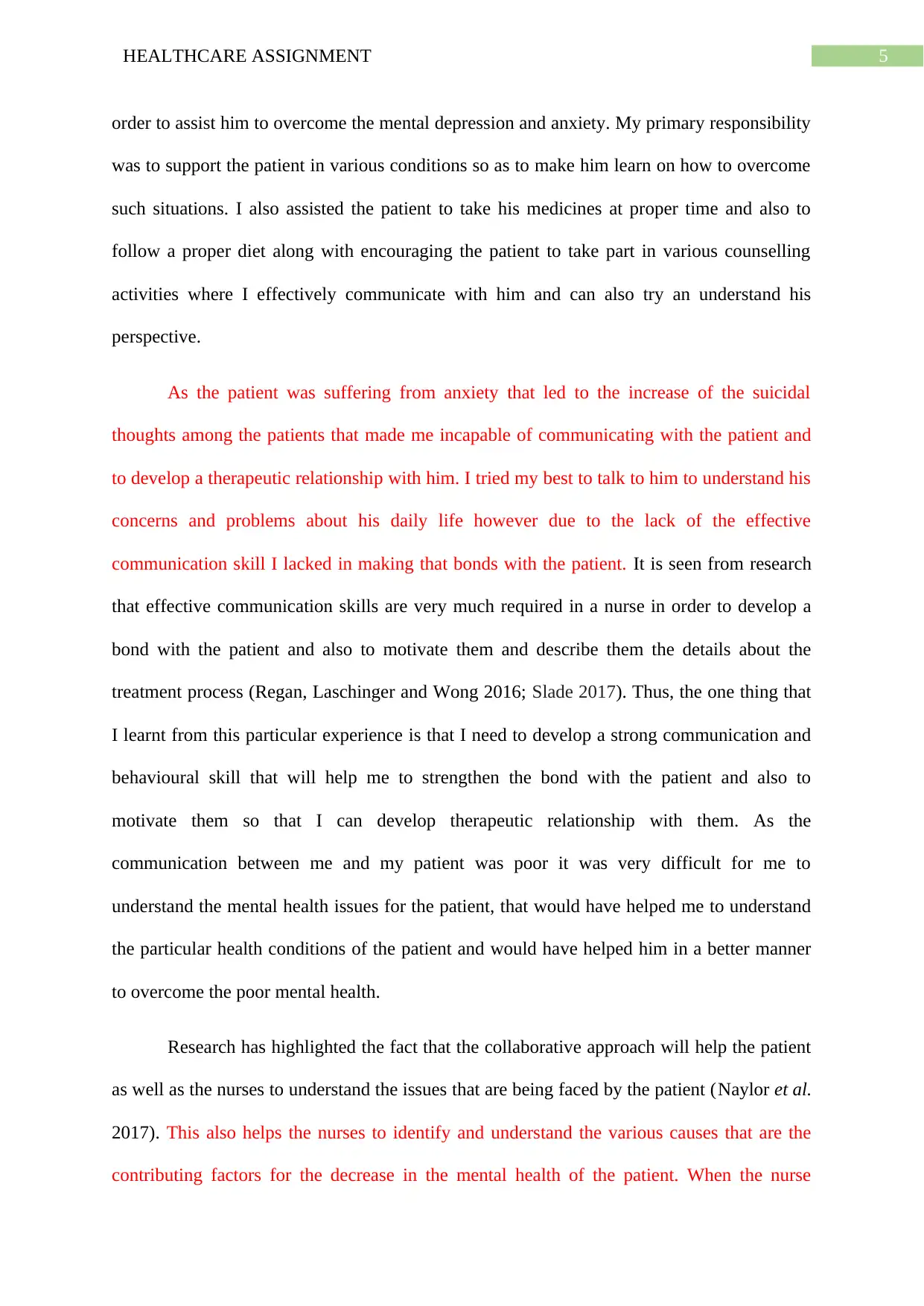
5HEALTHCARE ASSIGNMENT
order to assist him to overcome the mental depression and anxiety. My primary responsibility
was to support the patient in various conditions so as to make him learn on how to overcome
such situations. I also assisted the patient to take his medicines at proper time and also to
follow a proper diet along with encouraging the patient to take part in various counselling
activities where I effectively communicate with him and can also try an understand his
perspective.
As the patient was suffering from anxiety that led to the increase of the suicidal
thoughts among the patients that made me incapable of communicating with the patient and
to develop a therapeutic relationship with him. I tried my best to talk to him to understand his
concerns and problems about his daily life however due to the lack of the effective
communication skill I lacked in making that bonds with the patient. It is seen from research
that effective communication skills are very much required in a nurse in order to develop a
bond with the patient and also to motivate them and describe them the details about the
treatment process (Regan, Laschinger and Wong 2016; Slade 2017). Thus, the one thing that
I learnt from this particular experience is that I need to develop a strong communication and
behavioural skill that will help me to strengthen the bond with the patient and also to
motivate them so that I can develop therapeutic relationship with them. As the
communication between me and my patient was poor it was very difficult for me to
understand the mental health issues for the patient, that would have helped me to understand
the particular health conditions of the patient and would have helped him in a better manner
to overcome the poor mental health.
Research has highlighted the fact that the collaborative approach will help the patient
as well as the nurses to understand the issues that are being faced by the patient (Naylor et al.
2017). This also helps the nurses to identify and understand the various causes that are the
contributing factors for the decrease in the mental health of the patient. When the nurse
order to assist him to overcome the mental depression and anxiety. My primary responsibility
was to support the patient in various conditions so as to make him learn on how to overcome
such situations. I also assisted the patient to take his medicines at proper time and also to
follow a proper diet along with encouraging the patient to take part in various counselling
activities where I effectively communicate with him and can also try an understand his
perspective.
As the patient was suffering from anxiety that led to the increase of the suicidal
thoughts among the patients that made me incapable of communicating with the patient and
to develop a therapeutic relationship with him. I tried my best to talk to him to understand his
concerns and problems about his daily life however due to the lack of the effective
communication skill I lacked in making that bonds with the patient. It is seen from research
that effective communication skills are very much required in a nurse in order to develop a
bond with the patient and also to motivate them and describe them the details about the
treatment process (Regan, Laschinger and Wong 2016; Slade 2017). Thus, the one thing that
I learnt from this particular experience is that I need to develop a strong communication and
behavioural skill that will help me to strengthen the bond with the patient and also to
motivate them so that I can develop therapeutic relationship with them. As the
communication between me and my patient was poor it was very difficult for me to
understand the mental health issues for the patient, that would have helped me to understand
the particular health conditions of the patient and would have helped him in a better manner
to overcome the poor mental health.
Research has highlighted the fact that the collaborative approach will help the patient
as well as the nurses to understand the issues that are being faced by the patient (Naylor et al.
2017). This also helps the nurses to identify and understand the various causes that are the
contributing factors for the decrease in the mental health of the patient. When the nurse
⊘ This is a preview!⊘
Do you want full access?
Subscribe today to unlock all pages.

Trusted by 1+ million students worldwide
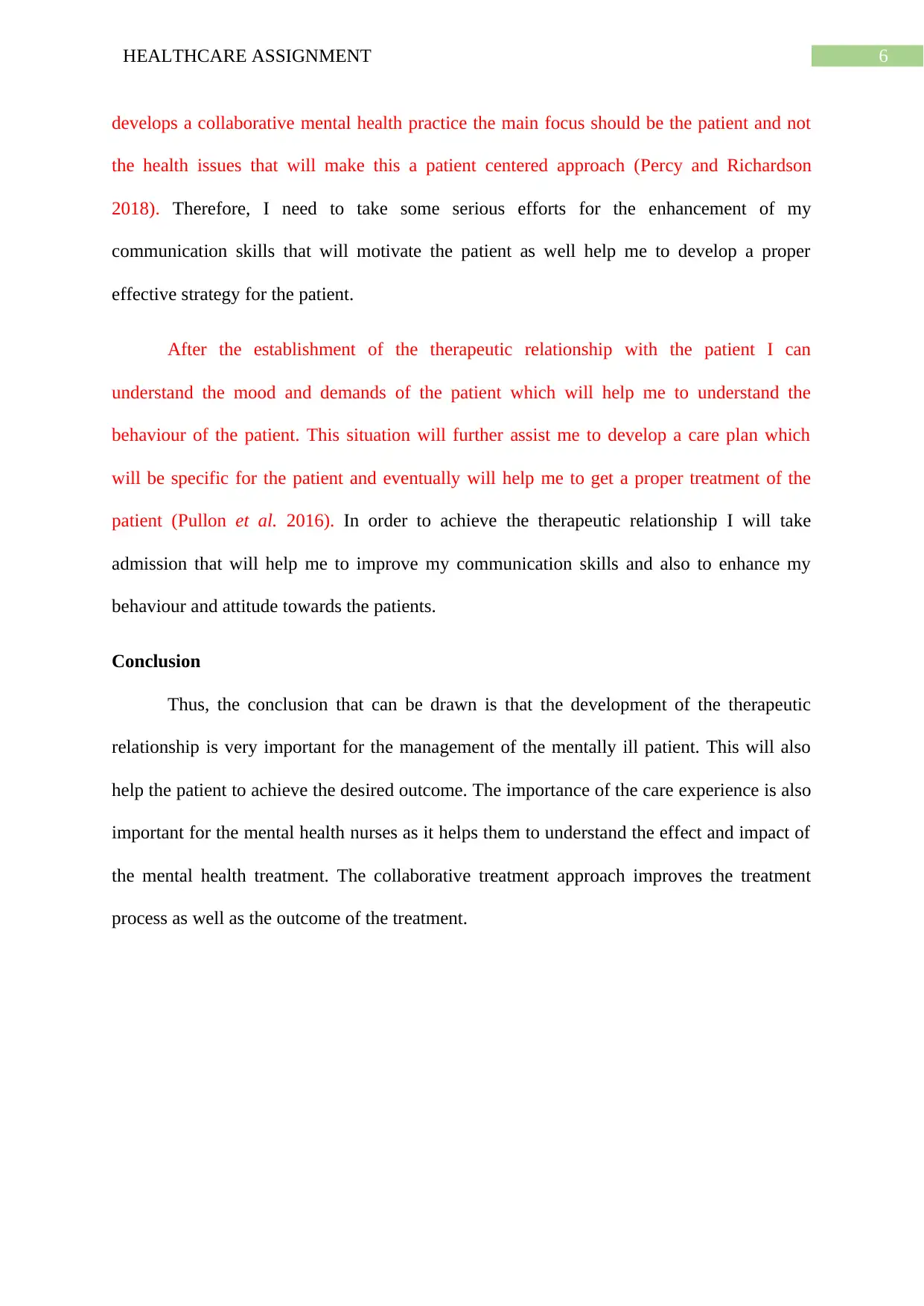
6HEALTHCARE ASSIGNMENT
develops a collaborative mental health practice the main focus should be the patient and not
the health issues that will make this a patient centered approach (Percy and Richardson
2018). Therefore, I need to take some serious efforts for the enhancement of my
communication skills that will motivate the patient as well help me to develop a proper
effective strategy for the patient.
After the establishment of the therapeutic relationship with the patient I can
understand the mood and demands of the patient which will help me to understand the
behaviour of the patient. This situation will further assist me to develop a care plan which
will be specific for the patient and eventually will help me to get a proper treatment of the
patient (Pullon et al. 2016). In order to achieve the therapeutic relationship I will take
admission that will help me to improve my communication skills and also to enhance my
behaviour and attitude towards the patients.
Conclusion
Thus, the conclusion that can be drawn is that the development of the therapeutic
relationship is very important for the management of the mentally ill patient. This will also
help the patient to achieve the desired outcome. The importance of the care experience is also
important for the mental health nurses as it helps them to understand the effect and impact of
the mental health treatment. The collaborative treatment approach improves the treatment
process as well as the outcome of the treatment.
develops a collaborative mental health practice the main focus should be the patient and not
the health issues that will make this a patient centered approach (Percy and Richardson
2018). Therefore, I need to take some serious efforts for the enhancement of my
communication skills that will motivate the patient as well help me to develop a proper
effective strategy for the patient.
After the establishment of the therapeutic relationship with the patient I can
understand the mood and demands of the patient which will help me to understand the
behaviour of the patient. This situation will further assist me to develop a care plan which
will be specific for the patient and eventually will help me to get a proper treatment of the
patient (Pullon et al. 2016). In order to achieve the therapeutic relationship I will take
admission that will help me to improve my communication skills and also to enhance my
behaviour and attitude towards the patients.
Conclusion
Thus, the conclusion that can be drawn is that the development of the therapeutic
relationship is very important for the management of the mentally ill patient. This will also
help the patient to achieve the desired outcome. The importance of the care experience is also
important for the mental health nurses as it helps them to understand the effect and impact of
the mental health treatment. The collaborative treatment approach improves the treatment
process as well as the outcome of the treatment.
Paraphrase This Document
Need a fresh take? Get an instant paraphrase of this document with our AI Paraphraser
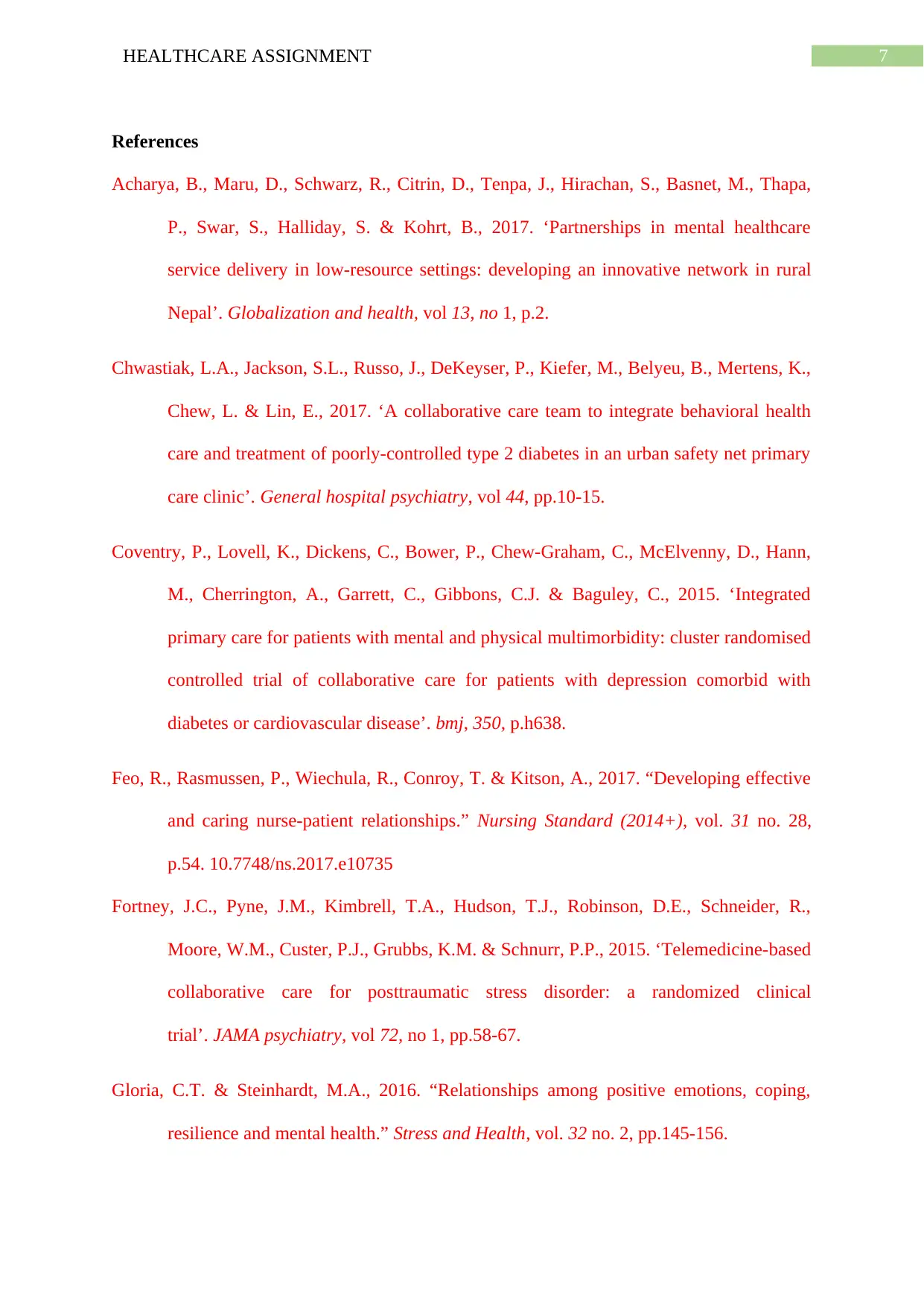
7HEALTHCARE ASSIGNMENT
References
Acharya, B., Maru, D., Schwarz, R., Citrin, D., Tenpa, J., Hirachan, S., Basnet, M., Thapa,
P., Swar, S., Halliday, S. & Kohrt, B., 2017. ‘Partnerships in mental healthcare
service delivery in low-resource settings: developing an innovative network in rural
Nepal’. Globalization and health, vol 13, no 1, p.2.
Chwastiak, L.A., Jackson, S.L., Russo, J., DeKeyser, P., Kiefer, M., Belyeu, B., Mertens, K.,
Chew, L. & Lin, E., 2017. ‘A collaborative care team to integrate behavioral health
care and treatment of poorly-controlled type 2 diabetes in an urban safety net primary
care clinic’. General hospital psychiatry, vol 44, pp.10-15.
Coventry, P., Lovell, K., Dickens, C., Bower, P., Chew-Graham, C., McElvenny, D., Hann,
M., Cherrington, A., Garrett, C., Gibbons, C.J. & Baguley, C., 2015. ‘Integrated
primary care for patients with mental and physical multimorbidity: cluster randomised
controlled trial of collaborative care for patients with depression comorbid with
diabetes or cardiovascular disease’. bmj, 350, p.h638.
Feo, R., Rasmussen, P., Wiechula, R., Conroy, T. & Kitson, A., 2017. “Developing effective
and caring nurse-patient relationships.” Nursing Standard (2014+), vol. 31 no. 28,
p.54. 10.7748/ns.2017.e10735
Fortney, J.C., Pyne, J.M., Kimbrell, T.A., Hudson, T.J., Robinson, D.E., Schneider, R.,
Moore, W.M., Custer, P.J., Grubbs, K.M. & Schnurr, P.P., 2015. ‘Telemedicine-based
collaborative care for posttraumatic stress disorder: a randomized clinical
trial’. JAMA psychiatry, vol 72, no 1, pp.58-67.
Gloria, C.T. & Steinhardt, M.A., 2016. “Relationships among positive emotions, coping,
resilience and mental health.” Stress and Health, vol. 32 no. 2, pp.145-156.
References
Acharya, B., Maru, D., Schwarz, R., Citrin, D., Tenpa, J., Hirachan, S., Basnet, M., Thapa,
P., Swar, S., Halliday, S. & Kohrt, B., 2017. ‘Partnerships in mental healthcare
service delivery in low-resource settings: developing an innovative network in rural
Nepal’. Globalization and health, vol 13, no 1, p.2.
Chwastiak, L.A., Jackson, S.L., Russo, J., DeKeyser, P., Kiefer, M., Belyeu, B., Mertens, K.,
Chew, L. & Lin, E., 2017. ‘A collaborative care team to integrate behavioral health
care and treatment of poorly-controlled type 2 diabetes in an urban safety net primary
care clinic’. General hospital psychiatry, vol 44, pp.10-15.
Coventry, P., Lovell, K., Dickens, C., Bower, P., Chew-Graham, C., McElvenny, D., Hann,
M., Cherrington, A., Garrett, C., Gibbons, C.J. & Baguley, C., 2015. ‘Integrated
primary care for patients with mental and physical multimorbidity: cluster randomised
controlled trial of collaborative care for patients with depression comorbid with
diabetes or cardiovascular disease’. bmj, 350, p.h638.
Feo, R., Rasmussen, P., Wiechula, R., Conroy, T. & Kitson, A., 2017. “Developing effective
and caring nurse-patient relationships.” Nursing Standard (2014+), vol. 31 no. 28,
p.54. 10.7748/ns.2017.e10735
Fortney, J.C., Pyne, J.M., Kimbrell, T.A., Hudson, T.J., Robinson, D.E., Schneider, R.,
Moore, W.M., Custer, P.J., Grubbs, K.M. & Schnurr, P.P., 2015. ‘Telemedicine-based
collaborative care for posttraumatic stress disorder: a randomized clinical
trial’. JAMA psychiatry, vol 72, no 1, pp.58-67.
Gloria, C.T. & Steinhardt, M.A., 2016. “Relationships among positive emotions, coping,
resilience and mental health.” Stress and Health, vol. 32 no. 2, pp.145-156.
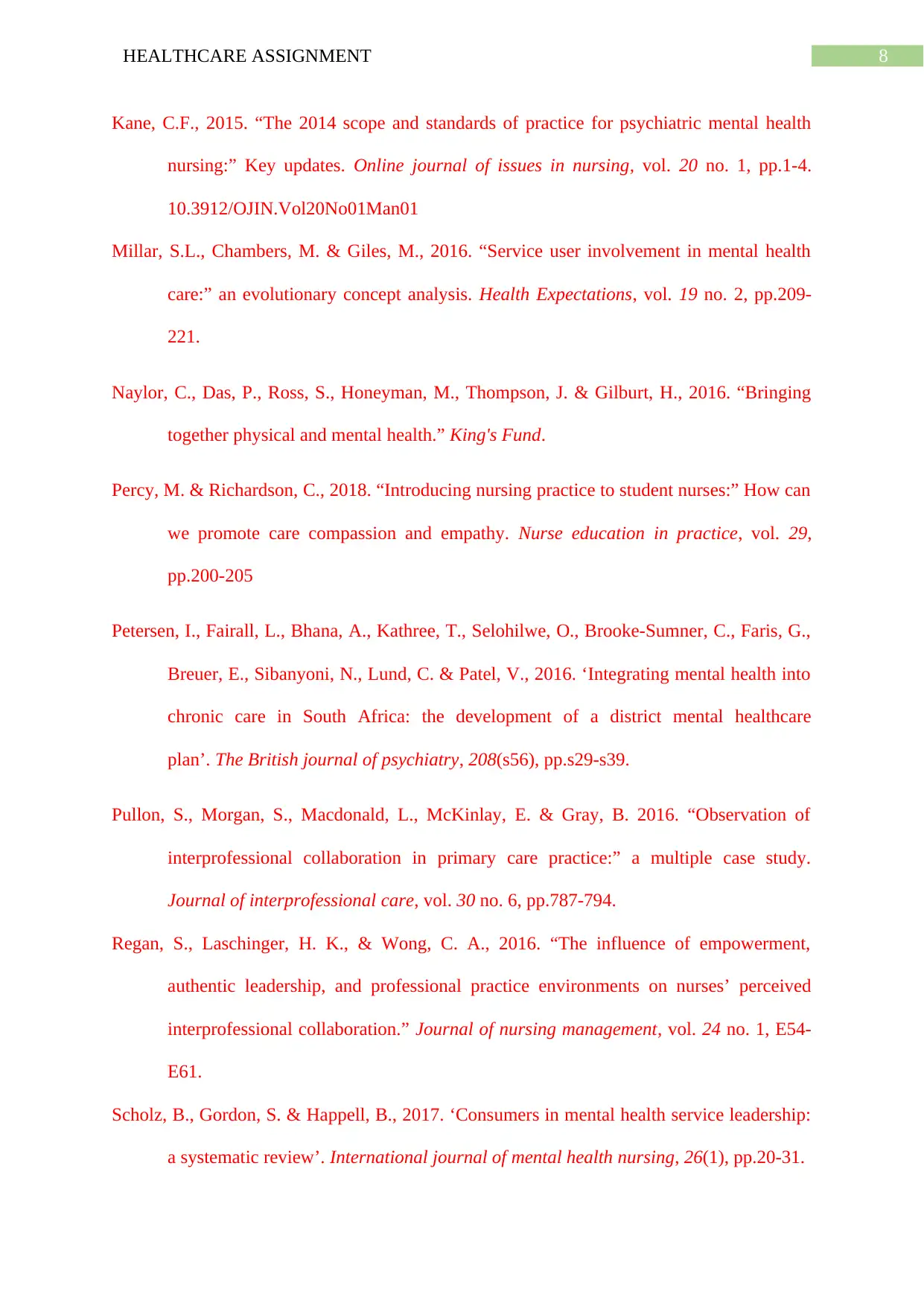
8HEALTHCARE ASSIGNMENT
Kane, C.F., 2015. “The 2014 scope and standards of practice for psychiatric mental health
nursing:” Key updates. Online journal of issues in nursing, vol. 20 no. 1, pp.1-4.
10.3912/OJIN.Vol20No01Man01
Millar, S.L., Chambers, M. & Giles, M., 2016. “Service user involvement in mental health
care:” an evolutionary concept analysis. Health Expectations, vol. 19 no. 2, pp.209-
221.
Naylor, C., Das, P., Ross, S., Honeyman, M., Thompson, J. & Gilburt, H., 2016. “Bringing
together physical and mental health.” King's Fund.
Percy, M. & Richardson, C., 2018. “Introducing nursing practice to student nurses:” How can
we promote care compassion and empathy. Nurse education in practice, vol. 29,
pp.200-205
Petersen, I., Fairall, L., Bhana, A., Kathree, T., Selohilwe, O., Brooke-Sumner, C., Faris, G.,
Breuer, E., Sibanyoni, N., Lund, C. & Patel, V., 2016. ‘Integrating mental health into
chronic care in South Africa: the development of a district mental healthcare
plan’. The British journal of psychiatry, 208(s56), pp.s29-s39.
Pullon, S., Morgan, S., Macdonald, L., McKinlay, E. & Gray, B. 2016. “Observation of
interprofessional collaboration in primary care practice:” a multiple case study.
Journal of interprofessional care, vol. 30 no. 6, pp.787-794.
Regan, S., Laschinger, H. K., & Wong, C. A., 2016. “The influence of empowerment,
authentic leadership, and professional practice environments on nurses’ perceived
interprofessional collaboration.” Journal of nursing management, vol. 24 no. 1, E54-
E61.
Scholz, B., Gordon, S. & Happell, B., 2017. ‘Consumers in mental health service leadership:
a systematic review’. International journal of mental health nursing, 26(1), pp.20-31.
Kane, C.F., 2015. “The 2014 scope and standards of practice for psychiatric mental health
nursing:” Key updates. Online journal of issues in nursing, vol. 20 no. 1, pp.1-4.
10.3912/OJIN.Vol20No01Man01
Millar, S.L., Chambers, M. & Giles, M., 2016. “Service user involvement in mental health
care:” an evolutionary concept analysis. Health Expectations, vol. 19 no. 2, pp.209-
221.
Naylor, C., Das, P., Ross, S., Honeyman, M., Thompson, J. & Gilburt, H., 2016. “Bringing
together physical and mental health.” King's Fund.
Percy, M. & Richardson, C., 2018. “Introducing nursing practice to student nurses:” How can
we promote care compassion and empathy. Nurse education in practice, vol. 29,
pp.200-205
Petersen, I., Fairall, L., Bhana, A., Kathree, T., Selohilwe, O., Brooke-Sumner, C., Faris, G.,
Breuer, E., Sibanyoni, N., Lund, C. & Patel, V., 2016. ‘Integrating mental health into
chronic care in South Africa: the development of a district mental healthcare
plan’. The British journal of psychiatry, 208(s56), pp.s29-s39.
Pullon, S., Morgan, S., Macdonald, L., McKinlay, E. & Gray, B. 2016. “Observation of
interprofessional collaboration in primary care practice:” a multiple case study.
Journal of interprofessional care, vol. 30 no. 6, pp.787-794.
Regan, S., Laschinger, H. K., & Wong, C. A., 2016. “The influence of empowerment,
authentic leadership, and professional practice environments on nurses’ perceived
interprofessional collaboration.” Journal of nursing management, vol. 24 no. 1, E54-
E61.
Scholz, B., Gordon, S. & Happell, B., 2017. ‘Consumers in mental health service leadership:
a systematic review’. International journal of mental health nursing, 26(1), pp.20-31.
⊘ This is a preview!⊘
Do you want full access?
Subscribe today to unlock all pages.

Trusted by 1+ million students worldwide

9HEALTHCARE ASSIGNMENT
Slade, M., 2017. ‘Implementing shared decision making in routine mental health
care’. World psychiatry, vol 16, no 2, pp.146-153.
Slade, M., 2017. ‘Implementing shared decision making in routine mental health
care’. World psychiatry, vol 16, no 2, pp.146-153.
1 out of 10
Related Documents
Your All-in-One AI-Powered Toolkit for Academic Success.
+13062052269
info@desklib.com
Available 24*7 on WhatsApp / Email
![[object Object]](/_next/static/media/star-bottom.7253800d.svg)
Unlock your academic potential
Copyright © 2020–2026 A2Z Services. All Rights Reserved. Developed and managed by ZUCOL.
![Mental Health Nursing Assignment: Lisa Case Study, [University Name]](/_next/image/?url=https%3A%2F%2Fdesklib.com%2Fmedia%2Fimages%2Fpe%2F5e790301b8374363b0168e51e06aa3a5.jpg&w=256&q=75)




